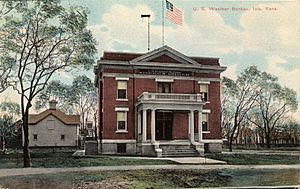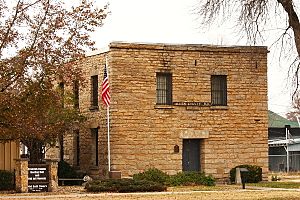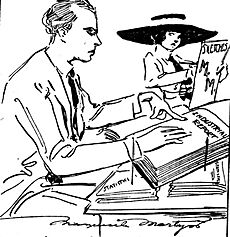Iola, Kansas facts for kids
Quick facts for kids
Iola, Kansas
|
||
|---|---|---|
|
City and County seat
|
||
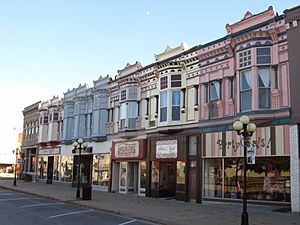
South side of the downtown square (2017)
|
||
|
||
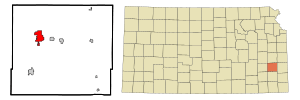
Location within Allen County and Kansas
|
||
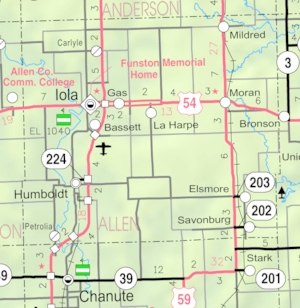
|
||
| Country | United States | |
| State | Kansas | |
| County | Allen | |
| Founded | 1859 | |
| Incorporated | 1870 | |
| Named for | Iola Colborn | |
| Government | ||
| • Type | Mayor-Council | |
| Area | ||
| • Total | 4.74 sq mi (12.27 km2) | |
| • Land | 4.46 sq mi (11.56 km2) | |
| • Water | 0.27 sq mi (0.71 km2) | |
| Elevation | 968 ft (295 m) | |
| Population
(2020)
|
||
| • Total | 5,396 | |
| • Density | 1,138.4/sq mi (439.77/km2) | |
| Time zone | UTC-6 (CST) | |
| • Summer (DST) | UTC-5 (CDT) | |
| ZIP code |
66749
|
|
| Area code | 620 | |
| FIPS code | 20-34300 | |
| GNIS ID | 485599 | |
Iola (/aɪˈoʊlə/) is a city in Allen County, Kansas, United States. It's the main town where the county government is located. You can find Iola along the Neosho River in southeast Kansas. In 2020, about 5,396 people lived there. The city was named after Iola Colborn, whose husband, Josiah Colborn, helped start the town.
Contents
History of Iola: How the City Began
The story of Iola began in 1859. People in the central and northern parts of Allen County were not happy with Humboldt being the county seat. So, a group of citizens decided to create a new town. They hoped this new town would become the county seat instead.
Founding the Town of Iola
On January 1, 1859, a large meeting was held. People decided to form a town company. They chose a spot for the new town near the Neosho River. This land was partly owned by J.F. Colborn and W.H. Cochrane. They bought the land and divided it into lots.
The town company worked hard to get the town going. They held a meeting to pick a name. Many names were suggested, but "Iola" was chosen by vote. This was the first name of J.F. Colborn's wife. The company met weekly to encourage people to move there. Anyone who bought a lot had to build something right away. Many people from a nearby town called Cofachique moved to Iola to help it grow.
First Settlers and Buildings
The very first building on the town site was a small log cabin owned by D.B. Bayne. Later in 1859, he added a frame house to it. The first new house built after the town was planned was finished in June 1859 by J.F. Colborn. He and his family moved in, becoming the first settlers in Iola. The first baby born in Iola was Luella E. Colborn.
Around 1859, a stone building was constructed. It was meant to be a safe place if there were problems with Native Americans or "Bushwhackers" (groups during the Civil War). When the Civil War started in 1861, this building became "Iola's fort." It protected local soldiers and army troops throughout the war.
Early Businesses and Growth
In 1859, two stores opened, run by Aaron Case and James Faulkner. They moved their businesses from Cofachique. The first hotel also opened. The post office moved from Cofachique to Iola in October 1859. By 1860, Iola had grown to about 150 people. Two more stores opened, selling dry goods and groceries.
Becoming the County Seat
The question of where the county seat should be caused a lot of arguments. An election was held on March 26, 1860, but Humboldt remained the county seat. People in Iola were still unhappy. After several years of debate, another election was held on May 19, 1865. This time, Iola won the vote and officially became the county seat. The county offices moved to Iola right away.
After the Civil War ended in 1865, Iola started to grow steadily. In March 1870, it officially became a city. The arrival of the Leavenworth, Lawrence and Galveston Railroad helped the town grow even faster.
Newspapers and Public Buildings
The first newspaper in Iola was the Allen County Courant, started on January 5, 1867. Its name changed several times over the years. On January 1, 1875, it became the Iola Register, which is still published today.
When Iola became the county seat, the town company gave 100 lots to the county. This helped pay for public buildings. In 1866, a building was bought to be used as the county courthouse. In 1877, a new stone courthouse was purchased. The old one was sold to the school district for $500. The schools were in two buildings: a large stone one built in 1868 and a two-story frame building.
The Allen County Jail was a strong stone building. It was built in 1869 for $8,400. In 1871, people voted to spend $5,000 to buy land for a "poor-farm," which was a place to help people who needed support.
Natural Gas Boom
A big change happened around 1895 when natural gas was discovered on December 25, 1893. This led to an economic boom! Many industries came to Iola, and the population grew a lot. By 1910, the city's population reached 9,032 people.
Geography and Location
Iola is located on the east side of the Neosho River. Smaller creeks like Deer Creek, Rock Creek, and Coon Creek flow through the city. There are important natural gas fields nearby.
Two major roads, U.S. Route 54 and U.S. Route 169, pass through or near Iola. The cities of Gas and La Harpe are a few miles east. The tiny city of Bassett is right next to Iola's southern edge. Humboldt is about 7 miles (11 km) south.
The United States Census Bureau says Iola covers about 4.81 square miles (12.46 km2). Most of this is land, with a small part being water.
What's the Weather Like in Iola?
The climate in Iola has hot, humid summers. Winters are usually mild to cool. It's known as a humid subtropical climate, which means it gets plenty of rain and has warm temperatures for much of the year.
| Climate data for Iola, Kansas, 1991–2020 normals, extremes 1959–present | |||||||||||||
|---|---|---|---|---|---|---|---|---|---|---|---|---|---|
| Month | Jan | Feb | Mar | Apr | May | Jun | Jul | Aug | Sep | Oct | Nov | Dec | Year |
| Record high °F (°C) | 74 (23) |
84 (29) |
88 (31) |
95 (35) |
96 (36) |
106 (41) |
109 (43) |
108 (42) |
105 (41) |
96 (36) |
83 (28) |
78 (26) |
109 (43) |
| Mean maximum °F (°C) | 65.3 (18.5) |
70.6 (21.4) |
78.6 (25.9) |
83.5 (28.6) |
88.0 (31.1) |
93.0 (33.9) |
97.9 (36.6) |
97.8 (36.6) |
93.5 (34.2) |
86.1 (30.1) |
74.1 (23.4) |
65.9 (18.8) |
99.3 (37.4) |
| Mean daily maximum °F (°C) | 41.4 (5.2) |
46.8 (8.2) |
56.9 (13.8) |
66.5 (19.2) |
74.9 (23.8) |
84.1 (28.9) |
88.5 (31.4) |
87.8 (31.0) |
80.3 (26.8) |
69.3 (20.7) |
56.0 (13.3) |
44.3 (6.8) |
66.4 (19.1) |
| Daily mean °F (°C) | 30.9 (−0.6) |
35.7 (2.1) |
45.5 (7.5) |
55.6 (13.1) |
65.2 (18.4) |
74.6 (23.7) |
78.9 (26.1) |
77.3 (25.2) |
69.3 (20.7) |
57.8 (14.3) |
45.3 (7.4) |
34.4 (1.3) |
55.9 (13.3) |
| Mean daily minimum °F (°C) | 20.3 (−6.5) |
24.7 (−4.1) |
34.2 (1.2) |
44.7 (7.1) |
55.5 (13.1) |
65.1 (18.4) |
69.2 (20.7) |
66.8 (19.3) |
58.3 (14.6) |
46.3 (7.9) |
34.5 (1.4) |
24.4 (−4.2) |
45.3 (7.4) |
| Mean minimum °F (°C) | 2.4 (−16.4) |
7.7 (−13.5) |
16.5 (−8.6) |
28.8 (−1.8) |
40.4 (4.7) |
53.1 (11.7) |
59.3 (15.2) |
55.8 (13.2) |
42.5 (5.8) |
29.4 (−1.4) |
18.9 (−7.3) |
7.3 (−13.7) |
−1.7 (−18.7) |
| Record low °F (°C) | −16 (−27) |
−24 (−31) |
−1 (−18) |
19 (−7) |
28 (−2) |
45 (7) |
50 (10) |
45 (7) |
30 (−1) |
18 (−8) |
3 (−16) |
−19 (−28) |
−24 (−31) |
| Average precipitation inches (mm) | 1.27 (32) |
1.56 (40) |
2.63 (67) |
4.42 (112) |
5.81 (148) |
5.36 (136) |
4.72 (120) |
4.04 (103) |
4.35 (110) |
3.64 (92) |
2.43 (62) |
1.81 (46) |
42.04 (1,068) |
| Average snowfall inches (cm) | 2.7 (6.9) |
1.1 (2.8) |
1.0 (2.5) |
0.0 (0.0) |
0.0 (0.0) |
0.0 (0.0) |
0.0 (0.0) |
0.0 (0.0) |
0.0 (0.0) |
0.0 (0.0) |
0.2 (0.51) |
2.4 (6.1) |
7.4 (18.81) |
| Average precipitation days (≥ 0.01 in) | 5.1 | 5.4 | 7.7 | 9.1 | 10.6 | 8.9 | 8.1 | 7.1 | 7.2 | 7.6 | 6.3 | 5.4 | 88.5 |
| Average snowy days (≥ 0.1 in) | 1.9 | 1.0 | 0.5 | 0.0 | 0.0 | 0.0 | 0.0 | 0.0 | 0.0 | 0.0 | 0.2 | 1.1 | 4.7 |
| Source 1: NOAA | |||||||||||||
| Source 2: National Weather Service | |||||||||||||
Culture and Events
Iola has a special event each year called Farm City Days. It happens in mid-October and includes a parade and a carnival. This celebration started in 1971 to help people from the town connect with local farms. It's a way to show appreciation for the area's farming roots.
Population and People
| Historical population | |||
|---|---|---|---|
| Census | Pop. | %± | |
| 1880 | 1,096 | — | |
| 1890 | 1,706 | 55.7% | |
| 1900 | 5,791 | 239.4% | |
| 1910 | 9,032 | 56.0% | |
| 1920 | 8,513 | −5.7% | |
| 1930 | 7,160 | −15.9% | |
| 1940 | 7,244 | 1.2% | |
| 1950 | 7,094 | −2.1% | |
| 1960 | 6,885 | −2.9% | |
| 1970 | 6,493 | −5.7% | |
| 1980 | 6,938 | 6.9% | |
| 1990 | 6,351 | −8.5% | |
| 2000 | 6,302 | −0.8% | |
| 2010 | 5,704 | −9.5% | |
| 2020 | 5,396 | −5.4% | |
| U.S. Decennial Census Kansas Population Data 2010-2020 |
|||
Iola's Population in 2020
The 2020 United States census counted 5,396 people living in Iola. There were 2,291 households and 1,254 families. The population density was about 1,208 people per square mile (466/km2).
Most people in Iola (about 86.75%) were White. About 2.56% were Black, and 1.39% were Native American. About 5.0% of the population identified as Hispanic or Latino.
- About 26.6% of households had children under 18.
- 35.7% were married couples.
- 38.1% of households were people living alone.
- The average household had 2.3 people.
- About 13.6% of people had a college degree or higher.
The median age in Iola was 37.7 years old.
- 21.0% of the population was under 18.
- 19.8% were 65 years or older.
The average household income was about $39,107. About 16.7% of families and 20.8% of the total population lived below the poverty line. This included 36.0% of those under 18.
Iola's Population in 2010
In 2010, Iola had 5,704 people. There were 2,357 households. The population density was about 1,256 people per square mile (485/km2).
- About 91.4% of people were White.
- 3.3% were African American.
- 3.1% of the population was Hispanic or Latino.
About 30.3% of households had children under 18. The average household size was 2.28 people. The median age in the city was 36 years.
Education in Iola
Iola has a public school district called Iola USD 257. The district is known for its sports achievements, like the 2006 Kansas 4A Girls State Basketball Champions.
Colleges and Universities
- Allen Community College is located in Iola.
Transportation
Bus service is available from Iola. You can travel north towards Kansas City, Missouri or south towards Tulsa, Oklahoma using Jefferson Lines.
The Allen County Airport is located three miles south of the city.
Media
Newspapers
- The Iola Register is the local newspaper. It's published on weekdays and Saturdays. It's known for focusing on important local issues.
Radio Stations
- KIKS 101.5 FM
- KIOL 1370 AM
Both are 24-hour radio stations.
Notable People from Iola
- Johnny Adams: A famous jockey and horse trainer who grew up in Iola.
- Dean Hargrove: A television producer, writer, and director, known for creating mystery shows.
- Lila Leeds: An actress who was born in Iola.
- William Newbury: Served as mayor of Iola and later became mayor of Portland, Oregon.
- Randy Stuart: An actress.
- David Toland: Served as the secretary of the Kansas Department of Commerce and as Lieutenant Governor of Kansas.
- J. Roger Beatty: A research fellow for the B. F. Goodrich company.
See also
 In Spanish: Iola (Kansas) para niños
In Spanish: Iola (Kansas) para niños



